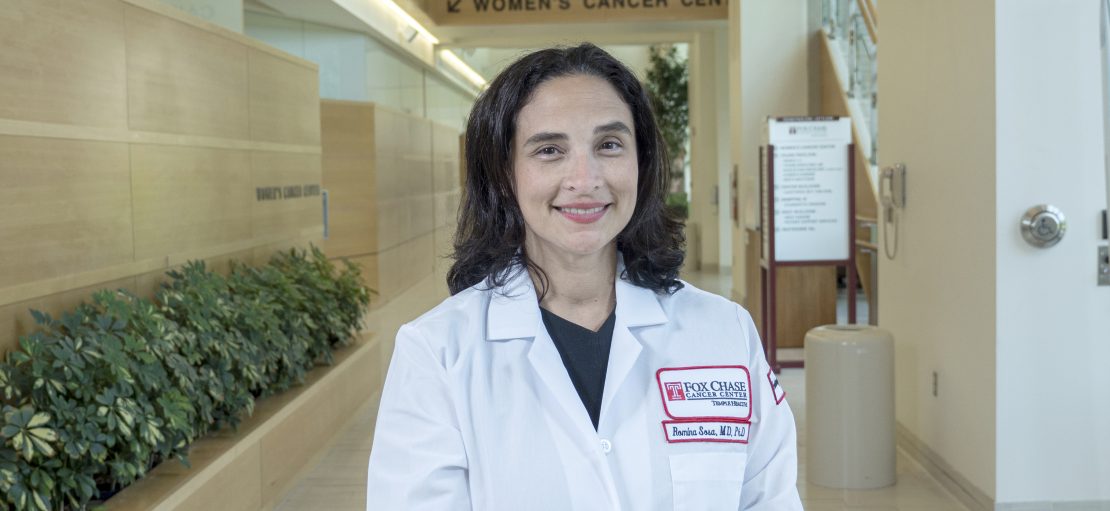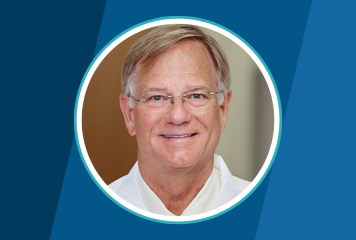Iberia Romina Sosa, MD, Ph.D., is an Associate Professor and Chief of the Division of Hematology at Fox Chase Cancer Center, part of Temple University Health System, in Philadelphia. She was recognized by Philadelphia Magazine as a Top Doctor in hematology in 2023. She is also one of the newest members of the ABIM Hematology Board, having joined in 2023.
How did you get into the specialty of hematology? What do you like about it?
I would say two contributing factors: first is mentorship. I did my predoctoral training in a research lab that studied T-cell mediated autoimmune responses in both myasthenia gravis and hemophilia. This gave me the opportunity to interact with experts in the field and I was lucky enough to work with some talented hematologists who introduced me to clinical hematology.
This leads me to the second contributing factor: my own neuroses. I was a bit of the stereotypical hypochondriac medical student. I decided at some point that I had acquired hemophilia. A post-doc in the lab, now a very successful hemophilia doctor at the University of Minnesota, Mark Reding, introduced me to the concept of low von Willebrand factor due to blood type O+ disease. I am not sure why but this revelation introduced me to the utilization of the coagulation laboratory to identify normal physiologic manifestations. It really appealed to my scientific brain. I realized how hematology is a complex puzzle that requires you to use good history, clinical exams and laboratory medicine to identify what is ailing your patient. These concepts have been reinforced time and time again during my training and it was what motivated me to pursue hematology as a career. I was very lucky to be surrounded by so many nurturing and talented doctors.
Your pre-medical degrees include psychology, as well as zoology and physiology; how did your path take you to medicine? Do you feel these fields still contribute to your work today?
I didn’t always know I wanted to be a doctor. I originally wanted to be a clinical psychologist. Medicine was not something I set out to do but it was something that I found and it “fit.”
One of my favorite things about medicine is the interaction with patients; all the reasons I wanted to be a psychologist in terms of counseling and nurturing people, I apply these to my practice every day. To be able to help patients understand their disease, their treatment, to allay their fears and bridge the barriers to care are important aspects of my job, and probably some of the most rewarding. I think that original training has helped me to be a better doctor.
My master’s was in zoology and physiology, with a greater emphasis on physiology which opened the door to pharmacology. I developed this aspect of my training further during post-doc training in Clinical Pharmacology and it constitutes a lot of my role as a clinical investigator in the cancer center.
What are your top areas of concern in medicine?
I have several, however, one that I encounter frequently is access to care. Many of the things that prevent me from taking care of the patient is not their willingness to receive care; sometimes it’s being able to afford the treatments or even to get an appointment. I think everybody should have access to a clinic visit, standard-of-care drugs and new innovation. Medicine is quickly evolving with new drugs and approaches but sometimes these are outside the reach of some patients simply because of the type of insurance or the cost of a drug. In addition to affordable care, we are also facing limitations with timeliness of care. Our practices are stretched thin with limited time available to see new patients and it is creating other issues including physician burnout. I often find myself making hard choices regarding overbooking a clinic to provide access at my own expense and that of my staff. These are continual challenges in medicine.
In the era of social media, we also find new challenges with delays to care. Patients will rely on what they have immediate access to: the internet, thereby becoming trapped in “Dr. Google.” This leads to their arrival at my clinic with misinformation and misappropriated fears. I try to be very thorough about the education I provide my patients and introduce them to internet resources and support groups that will promote their health rather than cause barriers. But it can be a challenge to work through the misinformation and to redirect conversations.
You’ve done extensive work in improving programs and materials for medical trainees. Can you talk about your interest in medical education? Why is this work important to you?
I want people to be as excited about their practice as I am about mine. Improving medical education and fostering enthusiasm for our practice leads to gains in patient care because knowledgeable, confident and enthusiastic doctors are great care providers. I am proud of the fact that my patients have a good understanding of their diseases, the challenges we face and the treatment plan we have committed to. I am a strong advocate for the idea that to enhance patient education and care, we need to invest in physician education and training. When my fellows have said to me that they finally understand something, there’s nothing more rewarding in this world. And when I see them teaching that same concept to another fellow, faculty or their own patients, I feel like my job has been well done.
What do you see as the role of mentorship?
Mentorship is extremely important in medicine. At one point or another, most of us have had a formative experience with another physician that has shaped the way we practice, and we want to emulate that. I believe that the passion, the commitment I have to medicine has a lot to do with what I’ve seen modeled by my early mentors.
Most of the institutions I have been a part of have a combined hematology/oncology fellowship. A common theme I hear with trainees is that hematology is too complex. In classical hematology, particularly, I’ve heard people say that we’re a dying breed. It disappoints me to hear that because what people refer to as “complex” is what originally motivated me to pursue hematology. I think if you have someone who is excited about the field and puts it into context and makes it interesting and fun, you’re going to be more likely to enjoy the experience and seek it out. I think we often shy away from things that are daunting. I love being able to break down a case and show fellows how to use basic principles to find a solution. When trainees and attending physicians work through this process together, there is a lot more enthusiasm for the final product. Hence, I am dedicated to medical education and nurturing the next generation. I was very lucky with regards to my prior mentors and it is important to keep on paying it forward.
Why is certification and ongoing learning important to you? How has it impacted your work as a physician?
Medicine is changing dramatically. During the course of training and in practice I have seen changes to the way we approach something, the workups we do, the available drugs—I think it’s imperative that we stay up to date so we can deliver good care to our patients and make sure they have the latest options. New literature comes out and it changes your practice. Medicine isn’t static, it’s continually evolving. Staying up to date is not something you do every ten years. You’re taking care of people, their lives and their health; that’s not trivial. Certification makes everybody accountable and provides patients with an understanding that their provider has done the homework to offer them the most updated standard of care.
Why did you want to join the Hematology Board and what do you hope to contribute?
It goes back to a continuous theme: mentorship. There were two very influential people in my life—Dr. Mark Udden and Dr. Anne Neff—who happened to be part of the Hematology Board, and during the period of time I’ve been in practice, both of them have contributed to how the specialty board has changed and how ABIM has changed in the way that we approach continuing medical education for practitioners—and I believe it has changed for the better. I remember talking to them about my concerns regarding a test every ten years and not staying up to date with education. Now I’ve seen all of these changes in how we do MOC—such as the introduction of the Longitudinal Knowledge Assessment (LKA®)—and I find it fabulous. Not only am I learning things I wouldn’t be learning at the same pace, but it’s also consistent with the way we practice medicine as opposed to scrambling to study for a test every ten years. I realize these statements also apply to the way I practice and that fields of practice vary among subspecialties and individuals. I hope that during my tenure, I can continue to make contributions such as those of my mentors, to examine changes in evolving medicine and tailor our certification process to something that allows all of us to continue to offer our patients excellent care.
What do you most want diplomates to know about you, professionally or personally?
I would like people to know I am a physician just like everybody else; I have the same struggles, and I want to be able to serve physicians, to make sure we are continuing to make changes and continuing to update things in a way that allows us all to continue to practice responsibly and to do that which we set out to do when we first enrolled in medical school.
I want people to know that I’m very committed to contributing to a system that permits us to meet the needs of our patients while responding to the continuing challenges of practicing medicine today. I am very honored to have been afforded this opportunity and I am enthusiastic about the future.



